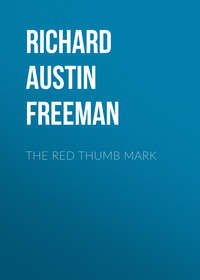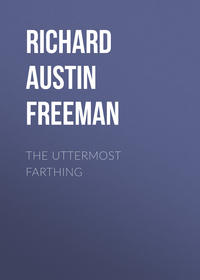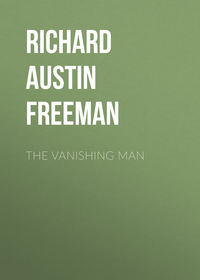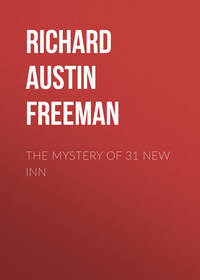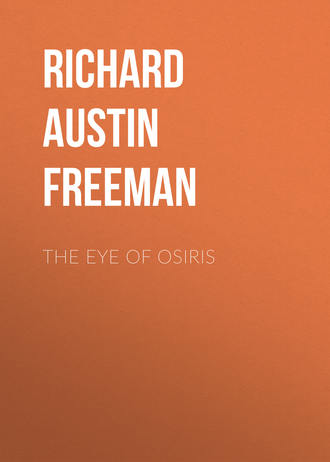 полная версия
полная версияThe Eye of Osiris
"The evidence, then, being insufficient to act upon," Thorndyke resumed, "there was nothing for it but to wait for some new facts. Now, the study of a large series of carefully conducted murders brings into view an almost invariable phenomenon. The cautious murderer, in his anxiety to make himself secure, does too much; and it is this excess of precaution that leads to detection. It happens constantly; indeed, I may say that it always happens—in those murders that are detected; of those that are not we say nothing—and I had strong hopes that it would happen in this case. And it did.
"At the very moment when my client's case seemed almost hopeless, some human remains were discovered at Sidcup. I read the account of the discovery in the evening paper, and scanty as the report was, it recorded enough facts to convince me that the inevitable mistake had been made."
"Did it, indeed?" said Mr. Jellicoe. "A mere, inexpert, hearsay report! I should have supposed it to be quite valueless from a scientific point of view."
"So it was," said Thorndyke. "But it gave the date of the discovery and the locality, and it also mentioned what bones had been found. Which were all vital facts. Take the question of time. These remains, after lying perdu for two years, suddenly come to light just as the parties—who have also been lying perdu—have begun to take action in respect of the will; in fact, within a week or two of the hearing of the application. It was certainly a remarkable coincidence. And when the circumstances that occasioned the discovery were considered, the coincidence became more remarkable still. For these remains were found on land actually belonging to John Bellingham, and their discovery resulted from certain operations (the clearing of the watercress-beds) carried out on behalf of the absent landlord. But by whose orders were those works undertaken? Clearly by the orders of the landlord's agent. But the landlord's agent was known to be Mr. Jellicoe. Therefore these remains were brought to light at this peculiarly opportune moment by the action of Mr. Jellicoe. The coincidence, I say again, was very remarkable.
"But what instantly arrested my attention on reading the newspaper report was the unusual manner in which the arm had been separated; for, besides the bones of the arm proper, there were those of what anatomists call the 'shoulder-girdle'—the shoulder-blade and collar-bone. This was very remarkable. It seemed to suggest a knowledge of anatomy, and yet no murderer, even if he possessed such knowledge, would make a display of it on such an occasion. It seemed to me that there must be some other explanation. Accordingly, when other remains had come to light and all had been collected at Woodford, I asked my friend Berkeley to go down there and inspect them. He did so, and this is what he found:
"Both arms had been detached in the same peculiar manner; both were complete, and all the bones were from the same body. The bones were quite clean—of soft structures, I mean. There were no cuts, scratches or marks on them. There was not a trace of adipocere—the peculiar waxy soap that forms in bodies that decay in water or in a damp situation. The right hand had been detached at the time the arm was thrown into the pond, and the left ring finger had been separated and had vanished. This latter fact had attracted my attention from the first, but I will leave its consideration for the moment and return to it later."
"How did you discover that the hand had been detached?" Mr. Jellicoe asked.
"By the submersion marks," replied Thorndyke. "It was lying on the bottom of the pond in a position which would have been impossible if it had been attached to the arm."
"You interest me exceedingly," said Mr. Jellicoe. "It appears that a medico-legal expert finds 'books in the running brooks, sermons in bones, and evidence in everything.' But don't let me interrupt you."
"Doctor Berkeley's observations," Thorndyke resumed, "together with the medical evidence at the inquest, led me to certain conclusions.
"Let me state the facts which were disclosed.
"The remains which had been assembled formed a complete human skeleton with the exception of the skull, one finger, and the legs from the knee to the ankle, including both knee-caps. This was a very impressive fact; for the bones that were missing included all those which could have been identified as belonging or not belonging to John Bellingham; and the bones that were present were the unidentifiable remainder.
"It had a suspicious appearance of selection.
"But the parts that were present were also curiously suggestive. In all cases the mode of dismemberment was peculiar; for an ordinary person would have divided the knee-joint leaving the knee-cap attached to the thigh, whereas it had evidently been left attached to the shinbone; and the head would most probably have been removed by cutting through the neck instead of being neatly detached from the spine. And all these bones were almost entirely free from marks or scratches such as would naturally occur in an ordinary dismemberment and all were quite free from adipocere. And now as to the conclusions which I drew from these facts. First, there was the peculiar grouping of the bones. What was the meaning of that? Well, the idea of a punctilious anatomist was obviously absurd, and I put it aside. But was there any other explanation? Yes, there was. The bones had appeared in the natural groups that are held together by ligaments; and they had separated at points where they were attached principally by muscles. The knee-cap, for instance, which really belongs to the thigh, is attached to it by muscle, but to the shin-bone by a stout ligament. And so with the bones of the arm; they are connected to one another by ligaments; but to the trunk only by muscle, excepting at one end of the collar-bone.
"But this was a very significant fact. Ligament decays much more slowly than muscle, so that in a body of which the muscles had largely decayed the bones might still be held together by ligament. The peculiar grouping therefore suggested that the body had been partly reduced to a skeleton before it was dismembered; that it had then been merely pulled apart and not divided with a knife.
"This suggestion was remarkably confirmed by the total absence of knife-cuts or scratches.
"Then there was the fact that all the bones were quite free from adipocere. Now, if an arm or a thigh should be deposited in water and left undisturbed to decay, it is certain that large masses of adipocere would be formed. Probably more than half of the flesh would be converted into this substance. The absence of adipocere therefore proved that the bulk of the flesh had disappeared or been removed from the bones before they were deposited in the pond. That, in fact, it was not a body, but a skeleton, that had been deposited.
"But what kind of skeleton? If it was the recent skeleton of a murdered man, then the bones had been carefully stripped of flesh so as to leave the ligaments intact. But this was highly improbable; for there could be no object in preserving the ligaments. And the absence of scratches was against this view.
"Then they did not appear to be graveyard bones. The collection was too complete. It is very rare to find a graveyard skeleton of which many of the small bones are not missing. And such bones are usually more or less weathered and friable.
"They did not appear to be bones such as may be bought at an osteological dealer's, for these usually have perforations to admit the macerating fluid to the marrow cavities. Dealers' bones, too, are very seldom all from the same body; and the small bones of the hand are drilled with holes to enable them to be strung on catgut.
"They were not dissecting-room bones, as there was no trace of red lead in the openings for the nutrient arteries.
"What the appearances did suggest was that these were parts of a body which had decayed in a very dry atmosphere (in which no adipocere would be formed), and which had been pulled or broken apart. Also that the ligaments which held the body—or rather skeleton—together were brittle and friable as suggested by the detached hand, which had probably broken off accidentally. But the only kind of body that completely answered this description is an Egyptian mummy. A mummy, it is true, has been more or less preserved; but on exposure to the air of such a climate as ours it perishes rapidly, the ligaments being the last of the soft parts to disappear.
"The hypothesis that these bones were parts of a mummy naturally suggested Mr. Jellicoe. If he had murdered John Bellingham and concealed his body in the mummy-case, he would have a spare mummy on his hands, and that mummy would have been exposed to the air and to somewhat rough handling.
"A very interesting circumstance connected with these remains was that the ring finger was missing. Now, fingers have on sundry occasions been detached from dead hands for the sake of the rings on them. But in such cases the object has been to secure a valuable ring uninjured. If this hand was the hand of John Bellingham, there was no such object. The purpose was to prevent identification; and that purpose would have been more easily, and much more completely, achieved by sacrificing the ring, by filing through it or breaking it off the finger. The appearances, therefore, did not quite agree with the apparent purpose.
"Then, could there be any other purpose with which they agreed better?
Yes, there could.
"If it had happened that John Bellingham were known to have worn a ring on that finger, and especially if that ring fitted tightly, the removal of the finger would serve a very useful purpose. It would create an impression that the finger had been removed on account of a ring, to prevent identification; which impression would, in turn, produce a suspicion that the hand was that of John Bellingham. And yet it would not be evidence that could be used to establish identity. Now, if Mr. Jellicoe were the murderer and had the body hidden elsewhere, vague suspicion would be precisely what he would desire, and positive evidence what he would wish to avoid.
"It transpired later that John Bellingham did wear a ring on that finger and that the ring fitted very tightly. Whence it followed that the absence of the finger was an additional point tending to implicate Mr. Jellicoe.
"And now let us briefly review this mass of evidence. You will see that it consists of a multitude of items, each either trivial or speculative. Up to the time of the actual discovery I had not a single crucial fact, nor any clue as to motive. But, slight as the individual points of evidence were, they pointed with impressive unanimity to one person—Mr. Jellicoe. Thus:
"The person who had the opportunity to commit murder and dispose of the body was Mr. Jellicoe.
"The deceased was last certainly seen alive with Mr. Jellicoe.
"An unidentified human body was delivered to the Museum by Mr. Jellicoe.
"The only person who could have a motive for personating the deceased was Mr. Jellicoe.
"The only known person who could possibly have done so was Mr. Jellicoe.
"One of the two persons who could have had a motive for dropping the scarab was Mr. Jellicoe. The person who found that scarab was Mr. Jellicoe, although, owing to his defective eyesight and his spectacles, he was the most unlikely person of those present to find it.
"The person who was responsible for the execution of the defective will was Mr. Jellicoe.
"Then as to the remains. They were apparently not those of John Bellingham, but parts of a particular kind of body. But the only person who was known to have had such a body in his possession was Mr. Jellicoe.
"The only person who could have had any motive for substituting those remains for the remains of the deceased was Mr. Jellicoe.
"Finally, the person who caused the discovery of those remains at that singularly opportune moment was Mr. Jellicoe.
"This was the sum of the evidence that was in my possession up to the time of the hearing and, indeed, for some time after, and it was not enough to act upon. But when the case had been heard in Court, it was evident either that the proceedings would be abandoned—which was unlikely—or that there would be new developments.
"I watched the progress of events with profound interest. An attempt had been made (by Mr. Jellicoe or some other person) to get the will administered without producing the body of John Bellingham; and that attempt had failed. The coroner's jury had refused to identify the remains; the Probate Court had refused to presume the death of the testator. As affairs stood the will could not be administered.
"What would be the next move?
"It was virtually certain that it would consist in the production of something which would identify the unrecognized remains as those of the testator.
"But what would that something be?
"The answer to that question would contain the answer to another question: 'Was my solution of the mystery the true solution?'
"If I was wrong, it was possible that some of the undoubtedly genuine bones of John Bellingham might presently be discovered; for instance, the skull, the knee-cap, or the left fibula, by any of which the remains could be positively identified.
"If I was right, only one thing could possibly happen. Mr. Jellicoe would have to play the trump card that he had been holding back in case the Court should refuse the application; a card that he was evidently reluctant to play.
"He would have to produce the bones of the mummy's finger, together with John Bellingham's ring. No other course was possible.
"But not only would the bones and the ring have to be found together. They would have to be found in a place which was accessible to Mr. Jellicoe, and so far under his control that he could determine the exact time when the discovery should be made.
"I waited patiently for the answer to my question. Was I right or was I wrong?
"And, in due course, the answer came.
"The bones and the ring were discovered in the well in the grounds of Godfrey Bellingham's late house. That house was the property of John Bellingham. Mr. Jellicoe was John Bellingham's agent. Hence it was practically certain that the date on which the well was emptied was settled by Mr. Jellicoe.
"The oracle had spoken.
"The discovery proved conclusively that the bones were not those of John Bellingham (for if they had been the ring would have been unnecessary for identification). But if the bones were not John Bellingham's, the ring was; from which followed the important corollary that whoever had deposited those bones in the well had had possession of the body of John Bellingham. And there could be no doubt that that person was Mr. Jellicoe.
"On receiving this final confirmation of my conclusions, I applied forthwith to Doctor Norbury for permission to examine the mummy of Sebek-hotep, with the result that you are already acquainted with."
As Thorndyke concluded, Mr. Jellicoe regarded him thoughtfully for a moment and then said: "You have given us a most complete and lucid exposition of your method of investigation, sir. I have enjoyed it exceedingly, and should have profited by it hereafter—under other circumstances. Are you sure you won't allow me to fill your glass?" He touched the stopper of the decanter, and Inspector Badger ostentatiously consulted his watch.
"Time is running on, I fear," said Mr. Jellicoe.
"It is, indeed," Badger assented emphatically.
"Well, I need not detain you long," said the lawyer. "My statement is a narration of events. But I desire to make it, and you, no doubt, will be interested to hear it."
He opened the silver case and selected a fresh cigarette, which, however, he did not light. Inspector Badger produced a funereal notebook, which he laid open on his knee; and the rest of us settled ourselves in our chairs with no little curiosity to hear Mr. Jellicoe's statement.
CHAPTER XX
THE END OF THE CASE
A profound silence had fallen on the room and its occupants. Mr. Jellicoe sat with his eyes fixed on the table as if deep in thought, the unlighted cigarette in one hand, the other grasping the tumbler of water. Presently Inspector Badger coughed impatiently and he looked up. "I beg your pardon, gentleman," he said. "I am keeping you waiting."
He took a sip from the tumbler, opened a match-box and took out a match, but apparently altering his mind, laid it down and commenced:
"The unfortunate affair which has brought you here to-night, had its origin ten years ago. At that time my friend Hurst became suddenly involved in financial difficulties—am I speaking too fast for you, Mr. Badger?"
"No, not at all," replied Badger. "I am taking it down in shorthand."
"Thank you," said Mr. Jellicoe. "He became involved in serious difficulties and came to me for assistance. He wished to borrow five thousand pounds to enable him to meet his engagements. I had a certain amount of money at my disposal, but I did not consider Hurst's security satisfactory; accordingly I felt compelled to refuse. But on the very next day, John Bellingham called on me with a draft of his will which he wished me to look over before it was executed.
"It was an absurd will, and I nearly told him so; but then an idea occurred to me in connection with Hurst. It was obvious to me, as soon as I glanced through the will, that, if the burial clause was left as the testator had drafted it, Hurst had a very good chance of inheriting the property; and, as I was named as the executor I should be able to give full effect to that clause. Accordingly, I asked for a few days to consider the will, and then I called upon Hurst and made a proposal to him; which was this: That I should advance him five thousand pounds without security; that I should ask for no repayment, but that he should assign to me any interest that he might have or acquire in the estate of John Bellingham up to ten thousand pounds, or two-thirds of any sum that he might inherit if over that amount. He asked if John had yet made any will, and I replied, quite correctly, that he had not. He inquired if I knew what testamentary arrangements John intended to make, and again I answered, quite correctly, that I believed John proposed to devise the bulk of his property to his brother, Godfrey.
"Thereupon, Hurst accepted my proposal; I made him the advance and he executed the assignment. After a few days' delay, I passed the will as satisfactory. The actual document was written from the draft by the testator himself; and a fortnight after Hurst had executed the assignment, John signed the will in my office. By the provisions of that will I stood an excellent chance of becoming virtually the principal beneficiary, unless Godfrey should contest Hurst's claim and the Court should override the conditions of clause two.
"You will now understand the motives which governed my subsequent actions. You will also see, Doctor Thorndyke, how very near to the truth your reasoning carried you; and you will understand, as I wish you to do, that Mr. Hurst was no party to any of these proceedings which I am about to describe.
"Coming now to the interview in Queen Square in October, nineteen hundred and two, you are aware of the general circumstances from my evidence in Court, which was literally correct up to a certain point. The interview took place in a room on the third floor, in which were stored the cases which John had brought with him from Egypt. The mummy was unpacked, as were some other objects that he was not offering to the Museum, but several cases were still unopened. At the conclusion of the interview I accompanied Doctor Norbury down to the street door, and we stood on the doorstep conversing for perhaps a quarter of an hour. Then Doctor Norbury went away and I returned upstairs.
"Now the house in Queen Square is virtually a museum. The upper part is separated from the lower by a massive door which opens from the hall and gives access to the staircase and which is fitted with a Chubb night-latch. There are two latch-keys, of which John used to keep one and I the other. You will find them both in the safe behind me. The caretaker had no key and no access to the upper part of the house unless admitted by one of us.
"At the time when I came in, after Doctor Norbury had left, the caretaker was in the cellar, where I could hear him breaking coke for the hot-water furnace. I had left John on the third floor opening some of the packing-cases by the light of a lamp with a tool somewhat like a plasterer's hammer; that is, a hammer with a small axe-blade at the reverse of the head. As I stood talking to Doctor Norbury, I could hear him knocking out the nails and wrenching up the lids; and when I entered the doorway leading to the stairs, I could still hear him. Just as I closed the staircase door behind me, I heard a rumbling noise from above; then all was still.
"I went up the stairs to the second floor, where, as the staircase was all in darkness, I stopped to light the gas. As I turned to ascend the next flight, I saw a hand projecting over the edge of the half-way landing. I ran up the stairs, and there, on the landing, I saw John lying huddled up in a heap at the foot of the top flight. There was a wound at the side of his forehead from which a little blood was trickling. The case-opener lay on the floor close by him and there was blood on the axe-blade. When I looked up the stairs I saw a rag of torn matting over the top stair.
"It was quite easy to see what had happened. He had walked quickly out on the landing with the case-opener in his hand. His foot had caught in the torn matting and he had pitched head foremost down the stairs still holding the case-opener. He had fallen so that his head had come down on the upturned edge of the axe-blade; he had then rolled over and the case-opener had dropped from his hand.
"I lit a wax match and stooped down to look at him. His head was in a very peculiar position, which made me suspect that his neck was broken. There was extremely little bleeding from the wound; he was perfectly motionless; I could detect no sign of breathing; and I felt no doubt that he was dead.
"It was an exceedingly regrettable affair, and it placed me, as I perceived at once, in an extremely awkward position. My first impulse was to send the caretaker for a doctor and a policeman; but a moment's reflection convinced me that there were serious objections to this course.
"There was nothing to show that I had not, myself, knocked him down with the case-opener. Of course, there was nothing to show that I had; but we were alone in the house with the exception of the caretaker, who was down in the basement out of earshot.
"There would be an inquest. At the inquest inquiries would be made as to the will which was known to exist. But as soon as the will was produced, Hurst would become suspicious. He would probably make a statement to the coroner and I should be charged with the murder. Or, even if I were not charged, Hurst would suspect me and would probably repudiate the assignment; and, under the circumstances, it would be practically impossible for me to enforce it. He would refuse to pay and I could not take my claim into Court.
"I sat down on the stairs just above poor John's body and considered the matter in detail. At the worst, I stood a fair chance of hanging; at the best, I stood to lose close upon fifty thousand pounds. These were not pleasant alternatives.
"Supposing, on the other hand, I concealed the body and gave out that John had gone to Paris. There was, of course, the risk of discovery, in which case I should certainly be convicted of the murder. But if no discovery occurred, I was not only safe from suspicion, but I secured the fifty thousand pounds. In either case there was considerable risk, but in one there was the certainty of loss, whereas in the other there was a material advantage to justify the risk. The question was whether it would be possible to conceal the body. If it were, then the contingent profit was worth the slight additional risk. But a human body is a very difficult thing to dispose of, especially by a person of so little scientific culture as myself.
"It is curious that I considered this question for a quite considerable time before the obvious solution presented itself. I turned over at least a dozen methods of disposing of the body, and rejected them all as impracticable. Then, suddenly, I remembered the mummy upstairs.




